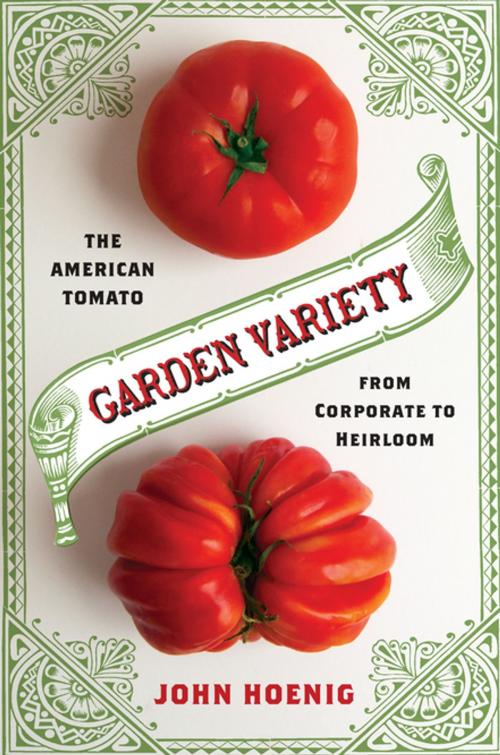Garden Variety
The American Tomato from Corporate to Heirloom
Business & Finance, Industries & Professions, Industries, Nonfiction, History, Americas, United States, 19th Century, 20th Century| Author: | John Hoenig | ISBN: | 9780231546386 |
| Publisher: | Columbia University Press | Publication: | November 21, 2017 |
| Imprint: | Columbia University Press | Language: | English |
| Author: | John Hoenig |
| ISBN: | 9780231546386 |
| Publisher: | Columbia University Press |
| Publication: | November 21, 2017 |
| Imprint: | Columbia University Press |
| Language: | English |
Chopped in salads, scooped up in salsa, slathered on pizza and pasta, squeezed onto burgers and fries, and filling aisles with roma, cherry, beefsteak, on-the-vine, and heirloom: where would American food, fast and slow, high and low, be without the tomato? The tomato represents the best and worst of American cuisine: though the plastic-looking corporate tomato is the hallmark of industrial agriculture, the tomato’s history also encompasses farmers’ markets and home gardens. Garden Variety illuminates American culinary culture from 1800 to the present, challenging a simple story of mass-produced homogeneity and demonstrating the persistence of diverse food cultures throughout modern America.
John Hoenig explores the path by which, over the last two centuries, the tomato went from a rare seasonal crop to America’s favorite vegetable. He pays particular attention to the noncorporate tomato. During the twentieth century, as food production, processing, and distribution became increasingly centralized, the tomato remained king of the vegetable garden and, in recent years, has become the centerpiece of alternative food cultures. Reading seed catalogs, menus, and cookbooks, and following the efforts of cooks and housewives to find new ways to prepare and preserve tomatoes, Hoenig challenges the extent to which branding, advertising, and marketing dominated twentieth-century American life. He emphasizes the importance of tomatoes to numerous immigrant groups and their influence on the development of American food cultures. Garden Variety highlights the limits on corporations’ ability to shape what we eat, inviting us to rethink the history of our foodways and to take the opportunity to expand the palate of American cuisine.
Chopped in salads, scooped up in salsa, slathered on pizza and pasta, squeezed onto burgers and fries, and filling aisles with roma, cherry, beefsteak, on-the-vine, and heirloom: where would American food, fast and slow, high and low, be without the tomato? The tomato represents the best and worst of American cuisine: though the plastic-looking corporate tomato is the hallmark of industrial agriculture, the tomato’s history also encompasses farmers’ markets and home gardens. Garden Variety illuminates American culinary culture from 1800 to the present, challenging a simple story of mass-produced homogeneity and demonstrating the persistence of diverse food cultures throughout modern America.
John Hoenig explores the path by which, over the last two centuries, the tomato went from a rare seasonal crop to America’s favorite vegetable. He pays particular attention to the noncorporate tomato. During the twentieth century, as food production, processing, and distribution became increasingly centralized, the tomato remained king of the vegetable garden and, in recent years, has become the centerpiece of alternative food cultures. Reading seed catalogs, menus, and cookbooks, and following the efforts of cooks and housewives to find new ways to prepare and preserve tomatoes, Hoenig challenges the extent to which branding, advertising, and marketing dominated twentieth-century American life. He emphasizes the importance of tomatoes to numerous immigrant groups and their influence on the development of American food cultures. Garden Variety highlights the limits on corporations’ ability to shape what we eat, inviting us to rethink the history of our foodways and to take the opportunity to expand the palate of American cuisine.















